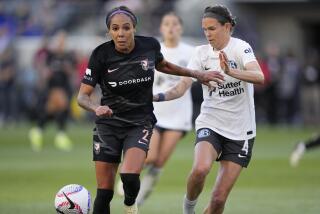COMMENTARY : Redskins Are a Bit Confused on Dues and Don’ts
- Share via
I’ve got one question about the Redskins vs. the National Football League Players Association: Where were these 37 non-dues-paying Redskins a few months back when it was time to speak up and speak out? When the debate was raging over whether the NFLPA was in the midst of really getting the players what they wanted or selling out for far too little, where were these 37 Redskins? Talk about after the fact. What did they do, fall asleep for a few months and wake up to find a new collective bargaining agreement in place? Or perhaps I fell asleep and missed all the objections coming from Redskin Park over what they felt would be an inadequate deal as negotiated by the NFLPA.
This just in: The Redskins, in the league as a group of responsible, alert men. If this many men, 37, had raised serious objections, somebody would have listened, whether it was peers on other teams, the league, NFLPA leaders or the media. It’s just not that far from Northern Virginia, where the team is headquartered, to L Street in downtown Washington,, where the NFLPA is headquartered. The NFLPA’s Doug Allen said he met with the Redskins players seven times in recent months, and there’s no reason to doubt him.
This isn’t about whether the Redskins should or shouldn’t disagree with the deal the NFLPA negotiated. The Redskins have that right. They ought to be in there making their feelings known, individually or as a bloc. Even if they’re the only club among 28 that feels a particular sentiment, the Redskins have that right. Or had it. There was a time for it, a window of opportunity to say, “Hold on, can’t we get a better deal than this? Do we have to accept a system in which veteran backups making a decent wage become expendable by definition?” That time passed. The Redskins, by officially voting for the deal, initialed it.
So this whole thing about whether the Redskins are subject to the labor laws of Virginia (a right-to-work state) or the District of Columbia (with no right-to-work law) is moot. (The Redskins’ letterhead, by the way, has addresses in Washington and Virginia.) The 37 ought to pay their union dues and get on with it. I don’t know if the current free agency system is as good as the NFLPA could have gotten. But I know that in the past five years the average salary of NFL players has jumped from $200,000 to $645,000. If the Newspaper Guild could produce that kind of leap in cash, I’d send the union leaders on a cruise. Before, there was no free agency except bogus Plan B. So there’s reasonable free agency, and there’s a limit to how much of the pie rookies can get, unlike the NBA.
The Redskins’ big complaint seems to be that the system, the way it’s designed, is going to penalize high-salaried, older players who are role players or backups. Those guys, in all probability, are going to get cut or have to play for a lot less to have jobs at all. Guess who has more of that kind of player than any club in the league? The Redskins, of course. Older, solid, heady, savvy veteran describes half the club the past six to eight years. But this was forseeable. Players and agents throughout the league knew before the deal was implemented that the NFL “middle class” was going to take a big hit. Freedom -- and that’s all free agency is -- has its price. I can’t imagine $5,000 is too much to pay, when every employee in every union shop in this country pays a larger percentage of his or her paycheck for representation.
The NFLPA should have far more items on its agenda than grievances against the Redskins 37 and hearing dates. It ought to be pressuring the league to put real grass in every stadium possible (even the domes) so that players don’t rip their legs apart unnecessarily and miss additional seasons at an average salary of $645,000. That’s the protest I want to see, players threatening not to play in Veterans Stadium in Philly unless somebody rips that stupid turf off the ground. How nice it would be to see a groundswell now, not later, men trying to close the barn door after the horses have gone down the road.
More to Read
Go beyond the scoreboard
Get the latest on L.A.'s teams in the daily Sports Report newsletter.
You may occasionally receive promotional content from the Los Angeles Times.










